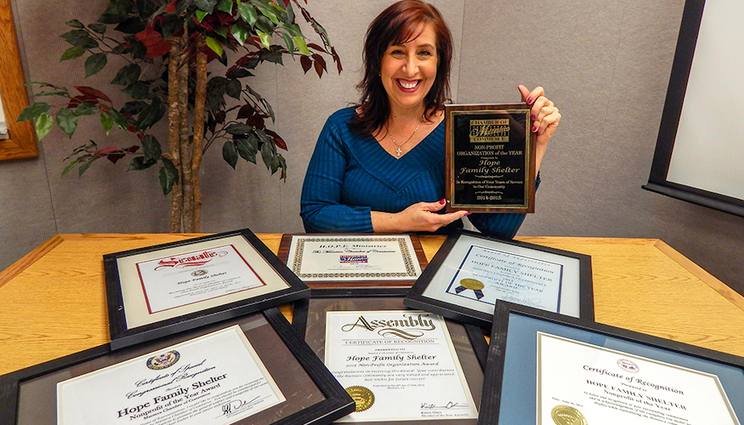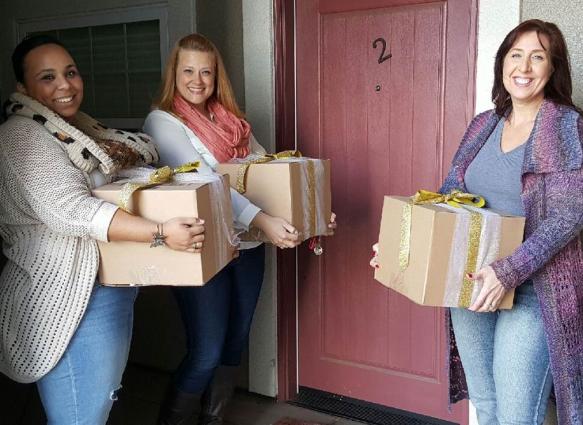Group provides homeless families with HOPE
 (Download Image)
Jennifer Gibson-Greenwood, a Lab employee who is the president of HOPE Ministries’ nine-member board of directors, is all smiles as she shows off some of the awards and certificates of recognition that the organization received in 2015. Photo by Julie Russell/LLNL.
(Download Image)
Jennifer Gibson-Greenwood, a Lab employee who is the president of HOPE Ministries’ nine-member board of directors, is all smiles as she shows off some of the awards and certificates of recognition that the organization received in 2015. Photo by Julie Russell/LLNL.
Editor's Note: During the HOME Campaign, Public Affairs will run a series of articles about Lawrence Livermore National Laboratory employees who volunteer for various nonprofit agencies.
When families in the Central Valley city of Manteca lose their homes, there is an emergency shelter that offers housing and something more – hope and help to get them back on their feet again.
Since its founding in 1993, HOPE Ministries has provided temporary housing in the organization’s three facilities to hundreds of men, women and children who have lost their homes or apartments.
Jennifer Gibson-Greenwood, a Lab employee who is a financial manager for the Global Security Principal Directorate, has served on HOPE Ministries’ nine-member board of directors for the past five years, including the past nearly two years as the board’s president.
In 2003, Gibson-Greenwood served as the treasurer for the Helping Others More Effectively (HOME) Campaign, when the Operations & Budget Directorate ran the fundraiser, and she visited the Stockton Women’s Shelter with a Newsline writer.
"Their program focused on domestic violence and I was touched by their facilities, their program and what they were doing for children. That’s something that has stayed with me all these years."
When fellow Manteca resident Bob Raymus, whose family had been instrumental in starting HOPE Ministries, approached Gibson-Greenwood about joining the organization’s board, she immediately said yes.
Her main goal, she said, was to work with her fellow board members to start with what HOPE Ministries had and to raise it to the level of professionalism she had seen at the Stockton Women’s Shelter.
"I have a special spot in my heart for children. I want to see them grow up and be exposed to a healthy environment. Children need to know that they’re important and that their parents also are important."
In Gibson-Greenwood’s view, 2015 has represented a stellar year for HOPE Ministries.
The shelter was honored by the Manteca Chamber of Commerce as the city’s "nonprofit of the year" and has since received certificates of recognition from U.S. Rep. Jeff Denham, State Sen. Cathleen Galgiani, Assemblywoman Kristin Olsen, the San Joaquin County Board of Supervisors and the Manteca City Council.
"Even with all of the recognition we’ve received this year, we’re still something of a hidden resource, even in our hometown of Manteca," Gibson-Greenwood said. "There are people who don’t even know that our town has a shelter for the homeless."
HOPE Ministries has three facilities that it uses to provide shelter for the homeless.
One of its buildings, known as Raymus House, consists of 10 rooms, serves only women and children, and allows residents to stay for as long as six months. Currently, the home provides housing to 27 people – 10 women and 17 children.
A second building, called HOPE Family Shelter, consists of eight one-bedroom apartments that serve as emergency shelter for six months or less for married couples with children and single-parent families. The shelter currently houses 10 adults and 12 children.
Its last building, called Building HOPE, is a transitional housing arrangement of eight two-bedroom apartments that permit married couples with children and single-parent families to stay for up to two years. One of the parents is required to hold a job and the families are charged up to 10 percent of their salary per month. That money, in turn, is saved in an account for them to help provide a down payment for the families when they seek permanent housing.
Three of these eight apartments are undergoing renovations. The five apartments in use now house seven adults and 16 children.
Gibson-Greenwood and the HOPE Ministries board hope to get the Manteca community and local churches more involved in supporting the shelter, such as through adopting rooms of the facilities. As families leave for permanent housing, new bedding, sheets, decorations and even occasional meals can be provided to assist the new residents.
"We can always use additional financial support, such as through the HOME Campaign, more volunteers to help with the shelter, and or even new board members," Gibson-Greenwood said.
People who have received emergency shelter from HOPE Ministries state that the housing and assistance have made a difference in their lives.
Elizabeth Alvarado, whose family stayed at the Building HOPE shelter for several months, said "HOPE Ministries has given me not only stability, but faith in myself. I now have a second chance at a better life."
Michelle Whitaker, another former resident who found temporary shelter, not only received a fresh start, but eventually became a staff member for HOPE Ministries, becoming its director of client services.
"HOPE Ministries gave me a chance when no one else would," Whitaker said. "The name says it all. My hope, faith in Christ and self-esteem was all reborn right here at Raymus House."
HOPE Ministries operates on an annual budget of about $200,000 per year, with its board members conducting much of the organization’s fundraising. Most of the shelter’s budget goes to pay for staff salaries, maintenance of facilities and utilities.
HOPE Ministries has three paid staff members – its executive director; a director of client services, who interviews people who are seeking housing and assigns case managers; and a daily operations manager, who helps coordinate donations, among other tasks. Each family who comes to live at HOPE Ministries has a case manager, who works with the family to help them secure permanent housing.
In addition to providing shelter, HOPE Ministries offers parenting classes and a life skills class that assists residents in preparing resumes and honing their job interview abilities.
"We’re very pleased at the progress our board has made and what we’ve been able to do with the shelters," Gibson-Greenwood said. "The current staff we’ve been able to hire is top-notch and very dedicated."
Gibson-Greenwood has two children – a daughter, Sierra, 21, and a son, Hunter, 13 – who have been part of her volunteer efforts with HOPE Ministries as well as City Impact, which assists people in San Francisco.
"I wanted them to develop a heart to help people who are less fortunate or in bad circumstances. I’ve hoped that they would see the homeless as people and to realize that all of us can be one bad choice away from problems. Now they see them as people and they are interested in their stories and their lives."
In Gibson-Greenwood’s view, the problem of homeless people is something that seems to touch almost every community.
"There should be compassion and a helping hand for people who are homeless, but that is particularly the case for children, who through no fault of their own can be caught up in these situations. It is important to work to stop the cycle of homelessness for children."
Contact
 Stephen Wampler
Stephen Wampler
[email protected]
(925) 423-3107
Related Links
HOPE MinistriesTags
Community OutreachHOME Campaign
Featured Articles








